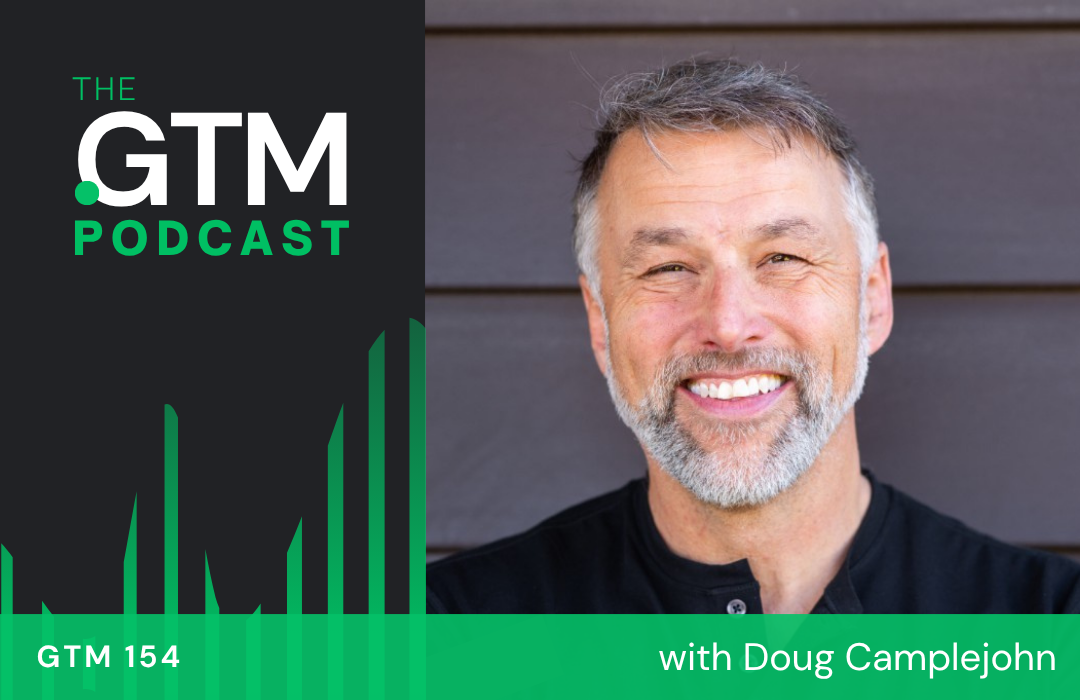Sales leaders play a critical role in a business’s success because they are responsible for driving revenue growth and developing and executing sales strategies. And some of the benefits of being a sales leader are high earning potential, the ability to impact the bottom line, and the opportunity for career advancement, flexibility, and building and leading a team.
But, on average, revenue executives have a shockingly short tenure due to various factors, including the stressful nature of the job, the need for constant results, and the fact that sales leaders are often the first to be held accountable when revenue targets are unmet.
In this episode of Sales Hacker, our host Colin Campbell welcomes Sam Jacobs, the founder and CEO of Pavilion. Sam hosted the Sales Hacker podcast for nearly five years, and he explains how that helped him grow the business. Sam and Colin discuss the challenges facing sales leaders, how Pavilion can help executives, and how you can succeed with kindness.
Guest-at-a-Glance
Name: Sam Jacobs
What he does: Sam is the founder and CEO of Pavilion.
Company: Pavilion
Noteworthy: Sam launched Pavilion as Revenue Collective in 2016 and bootstrapped the company to $10 million in ARR before taking on $25 million in growth financing, led by Elephant Ventures and GTM Fund in early 2021. Before Pavilion, Sam spent 15 years as a senior revenue leader at VC-backed companies in the New York area, including Gerson Lehrman Group, Axial, Livestream/Vimeo, The Muse, and Behavox. Sam is the author of Kind People Finish First and has also hosted the Sales Hacker Podcast.
Where to find Sam: LinkedIn l Website
Key Insights
⚡ On average, revenue executives have a very short tenure.
During his career, Sam has been the CRO or SVP of Sales Marketing at numerous organizations and has been fired several times. As he says, revenue executives have a shockingly short tenure on average. So, after several layoffs, he finally decided to start his own business — Revenue Collective (now Pavilion). “Somehow, I felt like getting fired made me more powerful; I don’t know how else to say it. That was when I decided to start charging dues. So, we’d been doing Revenue Collective, but it had just been like a quarterly meet-up, and I said, ‘You know what? I’m going to try to create some side income here.’ So, I started a consulting business. I sold my first sponsorship for Revenue Collective to the company Salesloft, and then I started charging dues on January 1st, 2018.”
⚡Pavilion is grounded in a charter of rights.
As a fired sales leader, Sam is trying to make a difference to executives through his company. So, at Pavilion, all executives have severance built into their employment agreements and two years to use their capital if they leave. Sam notes that he encourages people to be advisors and build their own consulting businesses. “We started Pavilion with this concept of a bill of rights, and the rights are: the right to due diligence, which means the right to know about your company before you start working there so that you can decide if it’s a good company; the right to align compensation, which means that I don’t think sales leaders should be paid 50% base, 50% commission; the right to liquidity, which means structuring the equity so that it has a greater chance of becoming cash; the right to severance; and the right to consult, [which is] the right to monetize your non-competitive expertise.”
⚡ Being direct is not the opposite of being kind.
It is often thought that you must be ruthless to get to the top or that leaders have certain traits that are similar to psychopaths. However, Sam’s book Kind Folks Finish First shows that that isn’t the only path. In this book, Sam gives practical business lessons with fresh perspectives on achieving success that are backed by personal experience building Pavilion into a nearly $200-million business rooted in kindness, reciprocity, and deeply held values. According to Sam, being kind means, among other things, being direct. “What I’ve seen is that when I’ve focused on the elements of kindness that I think are about business, what that means is focusing on the long term — building relationships, not transactions; trusting in some definition of karma; not needing to extract every last penny from every interaction, but allowing the idea that even if this particular door closes, another opens; sort of having some faith in something bigger than yourself; and then, also, really importantly, kindness not just to others, but to yourself and being yourself about how you think of yourself and what you think of yourself.”
Episode Highlights
Sam Jacobs as the Host of the Sales Hacker Podcast
“The podcast was foundational to the success of Pavilion and to my career. […] People started hearing the podcast, and because they were hearing the podcast, that was how people heard about Revenue Collective, which is now Pavilion. And that was where Tom Glasson first heard about me; he’s the London chapter head. That was where Andrei Brel, the chapter head from Amsterdam, heard about me. So, the podcast was really the way that I suddenly used to promote the community that I started, which is now called Pavilion. […]
We’re starting a new show under the Pavilion brand; it’s called Top Line, and it’s with me; AJ Bruno, the CEO of QuotaPath; and Asad Zaman, the CEO of Sales Talent Agency. And so, the three of us will be the regulars, and then we’ll bring on guests periodically to add to the conversation. We just recorded the first episode; I think it went okay. So stay tuned for that.”
Launching Revenue Collective (Now Pavilion)
“I had a lot of fear about starting my own thing. I still do carry a lot of fear with me all the time. I remember getting my first check for being a consultant from LeagueApps, which is a company that I’m still very close friends with. Brian Litvack, the CEO of LeagueApps, and Jeremy Goldberg, his co-founder, wrote me a $10,000 check to do some consulting for them. It was the first time I’d gotten $10,000, and I just deposited it into my checking account, and it was like, ‘Damn, that’s awesome.’ I didn’t have to share it. It was just this moment of like, ‘I can do this, and I can support myself,’ and that was the turning point in my life because it was when I let go of needing to be part of a particular type of rat race and say, ‘It’s okay if I’m never worth a hundred million dollars; that’s not the definition of success. I want to build something that’s mine, that I can stand behind, that fulfills me.'”
Advice for Sales Leaders
“You need to understand math. The sales leaders that only understand benchmarks but don’t understand math — you understand what all of your friends are doing, but you don’t know how to independently analyze your own business or other businesses — you are setting yourself up for big problems. Particularly the last couple of years, where if all you knew was, ‘We need to pay account executives this much money because that’s what everybody else is paying them,’ without any understanding of what your average deal size is, what your close rates are, what your margins are, you might be driving your company to the point of financial insolvency without even knowing it. […]
If you’re a VP of Sales, if you’re a sales leader managing other people, you are an allocator of capital. That’s what you do. The CEO allocates capital to you, and you allocate it to your team, and the purpose of that allocation is to create a return. And you can’t do that if you cannot be trusted, and you can’t be trusted if you are only seen as somebody with their own self-interest at heart, that you are there to advocate for your team. […]
What your job is, it’s to advocate on behalf of the company with your team, and to get them aligned, and to get them to understand why they need to do what they need to do and how that fits into the overall mission of the organization.”
What to check out next: 120 Sales Podcasts for Hungry Sales Professionals: 2023 Edition







